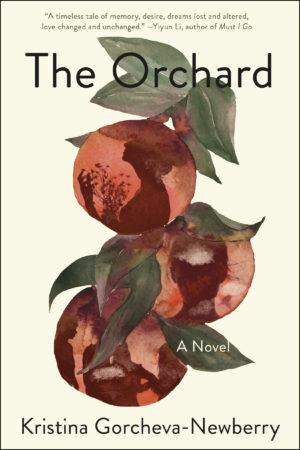The Orchard
by Kristina Gorcheva-Newberry
reviewed by Olive Fellows
Soon after becoming General Secretary of the Communist Party of the Soviet Union in 1985, Mikhail Gorbachev famously rebranded two Russian words: glasnost and perestroika, meaning openness and restructuring, respectively. With these words he ushered in a new era for the USSR, one in which citizens had more freedoms and economic options. It was a period of change unlike anything the nation had yet witnessed, and, for Soviet youth, it meant hope for the future. This was “Generation Perestroika,” as author Kristina Gorcheva-Newberry calls it in her debut novel The Orchard, a coming-of-age tale loosely inspired by Anton Chekhov’s final play, The Cherry Orchard.
The Orchard’s protagonist, Anya Raneva, is a part of this generation, though she doesn’t know it yet when the book opens. At first, she’s blissfully unaware of the changes to come, spending tranquil summer days with her best friend Milka at the family dacha, or country house, just outside Moscow, whose modest apple orchard plays a major role later on. Anya and Milka, friends since first grade, are like sisters when we meet them at age fourteen. They share everything—including their burgeoning sexual feelings, which prompt them to let two male classmates into their core friend group to form an uncomplicated party of four. By the end of the book’s first part, however, it becomes clear that there is much the prickly Milka is keeping from her best friend, which will result in a tragedy that scatters their once close-knit clique.
When the book’s second part opens, it’s the mid-2000s and Anya is living in Virginia with her American husband. She needs to return home for the first time in more than nineteen years to help her parents with a problem: a developer wants to buy the now intensely valuable land on which the family dacha sits. The image of their beloved apple orchard being cleared is too much to bear, not to mention the fact that the middleman pressuring them to sell is none other than a member of Anya’s childhood friend group. Anya’s return to her home country to attempt to save the dacha is painful, but it also gives her the chance to answer lingering questions and get some closure.
Gorcheva-Newberry highlights the interconnected nature of beginnings and endings in The Orchard—a not-at-all surprising thematic choice given the inspiration behind the novel. Chekhov’s 1903 play The Cherry Orchard shows an upper-class woman, completely in denial about her dire financial straits, slowly losing her cherry orchard to a family friend, a former serf turned businessman. Chekhov—whose cherry orchard stands for the dying off of the old order, the cluelessness of the Russian aristocracy and their inability to cope with the changing times—aimed for satire but achieved pathos, much as Gorcheva-Newberry does.
The play makes several appearances in The Orchard. The teenagers begrudgingly read and discuss it in class and ironically find themselves unable to relate to the characters, although, with the collapse of the Soviet Union on the horizon, they’ll soon know what it’s like to straddle the gap between old ways and new and see how changes that benefit society can be frightfully unkind to individuals. This becomes apparent after Anya’s return to Russia in part two, when she listens to her mother—fiercely critical of the Soviet system during her entire upbringing—lament the loss of the old order. Anya is shocked to hear this, but the threat of losing their precious orchard and the crushing cost of living in the so-called “New Russia” is enough to make her mother nostalgic.
Not even those who support the new system are guaranteed a happy ending. We don’t see how life eventually turned out for the former serf who seized his opportunity to acquire the titular cherry orchard in Chekhov’s play, but it’s possible the wars and revolutions to come crushed his dreams just as the rapid disappearance of democracy in the 1990s let down the young Soviets who wanted something better for their homeland. “Like kids who loved and pitied their ill, disabled parents,” writes Gorcheva-Newberry, “so did we love and pity our country; we worried for it, we revered it, and we wished desperately for it to get well.”
The breakup of the friend group in The Orchard is a powerful symbol of the betrayal of the Perestroika Generation, and the loss of Anya’s family dacha underscores the uncannily cyclical nature of Russian history: one system yields to another that ends up looking mighty similar to the one that came before, and with each upheaval comes a steep price that citizens are forced to pay. Gorcheva-Newberry beautifully renders these historical trends using Chekhov as a blueprint in this moving, tragic, and distinctly Russian tale.
Published on July 5, 2022

